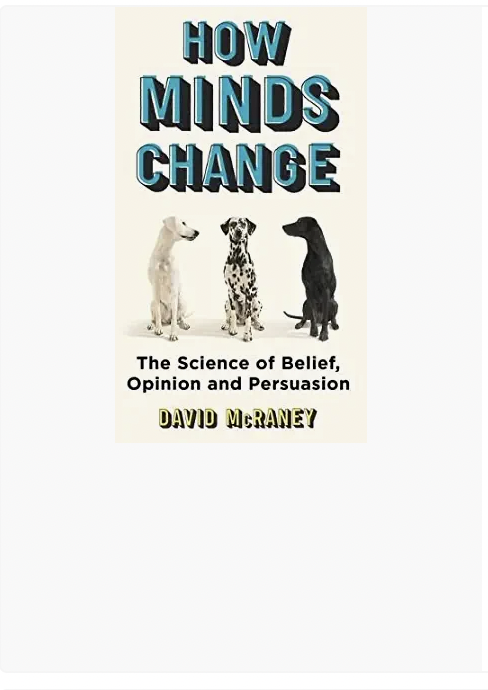
Limits of reasoning and power of groupthink


Britain voted to leave the EU, in 2016, according to a YouGov poll last month 54 per cent of UK adults think Brexit has gone badly, and only 16 per cent think it is going well.
David McRaney, a science journalist, self-delusion expert, psychology nerd, and one of our greatest thinkers on reasoning, used to think that there was no point in trying to change people’s minds because minds don’t change. But he has now changed his mind about this – and the result is his smart, stimulating book How Minds Change. The book is about science and the experience of transformation.
What made a prominent conspiracy- theorist YouTuber finally see that 9/11 was not a hoax. How do voter opinions shift from neutral to resolute? Can widespread social change only take place when a generation dies out? But then a diehard 9/11 Truther’s conversation blew up his theories- inspiring him to ask not just how to persuade, but why we believe, from the eye of the beholder. Delving into the latest research of psychologists and neuroscientists, How Minds change explores the limits of reasoning, the power of groupthink, and the effects of deep canvassing. It’s an eye-opening journey among cult members, conspiracy theorists, and political activists, from Westboro Baptist Church picketers to LGBTQ campaigners in California – that ultimately challenges us to question our own motives and beliefs.
How Minds Change reached surprising and thought-provoking conclusions, to demonstrate the rare but transformative circumstance under which minds can change.
To explain their thinking, looking for opportunities to get them to reflect and empathise with same-sex couples. McRaney spent time with others doing the equivalent of deep-canvassing. Some called it “street epistemology” but they were doing the same thing: slowly persuading people to reflect on their long-held beliefs in the hope that they might change them.
The facts don’t change people’s minds has been known for a long time. When the US entered the second world war, the army asked director Frank Capra to create a series of films to boost conscripts’ morale and to correct a few American misapprehensions, including the German military was weak, that the war would be over in a year and that the British hadn’t been doing a great job in fighting it.
Capra’s series Why We fight displayed British civilians and fighter pilots’ bravery in repelling the Luftwaffe. “ The top brass of the United States Army thought what everyone thinks at first. Give people the facts and they will change their minds” McRaney writes. But when Americans had finished watching the films, they held the same opinions. Why don’t facts change our minds? Because facts that challenge our beliefs threaten us, McRaney reveals a 2016 university of Southern California study in which people were monitored in an MRI scanner while they were presented with information contradicting their deeply held views. A gun-control advocate was told that 10 times more people are murdered with kitchen knives. We dislike having our views challenged not only because we hold them deeply, but because we worry about how changing our minds will affect our reputations with people who think like us. Evolution has thought us the value of being part of groups that can defend us against hostile outsiders. We worry that adopting new opinions will leave us beyond the group’s protective embrace.
Was it perhaps generational change that sparked the reversal of same-sex marriage? If we look at those Brexit polls, young people are far more pro-EU than their elders. About how to persuade those who disagree with me, particularly on the uselessness of bombarding them with facts.
How Minds Change: The New Science of Belief, Opinion, and Persuasion by David McRaney, One World £18.99, 352 pages.
